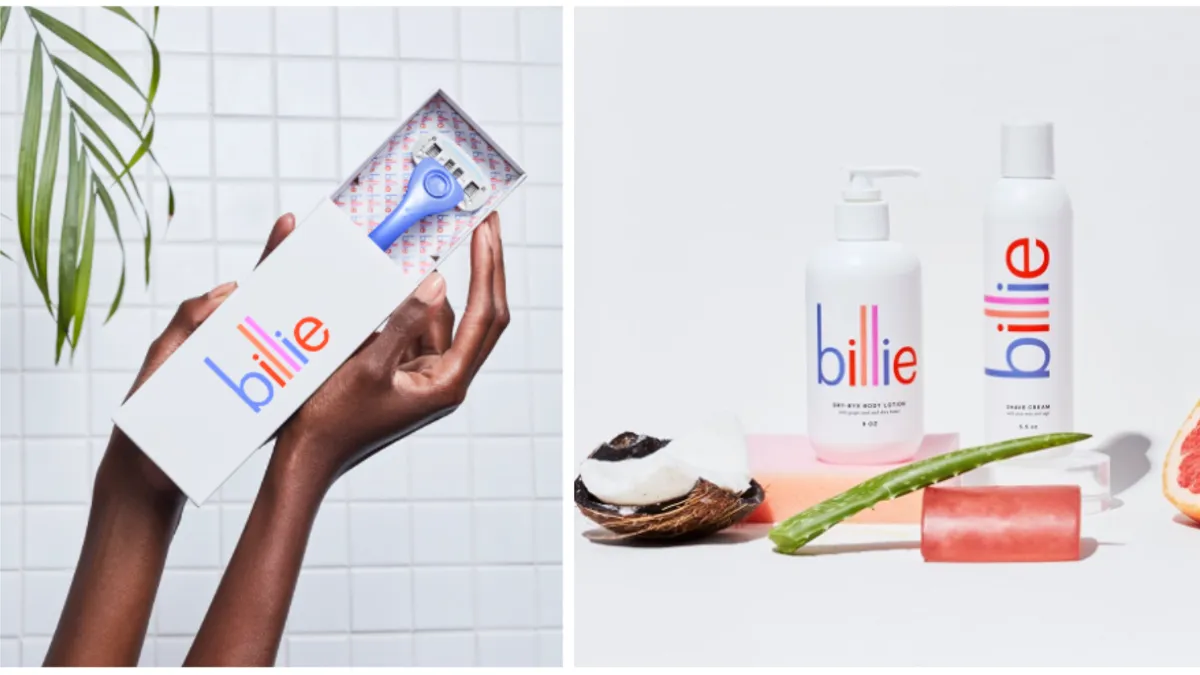Dive Brief:
- Female-focused direct-to-consumer (DTC) razor brand Billie launched "Project Body Hair," a campaign that addresses the issue of women's body hair, which it views as under-represented in the category, per news shared with Marketing Dive.
- As part of the campaign, Billie released a video that acknowledges and celebrates female body hair in all forms. Billie is focusing on the message that women should shave only if and when they want to and that they should never pay more for a razor just because it's pink, referring to the so-called "pink tax" often placed on certain personal care items for women.
- Billie is asking consumers to share images that show positive depictions of women with body hair by uploading them at ProjectBodyHair.com and using the hashtag #projectbodyhair on social media. The company is also donating photography of women with body hair to stock photo site Unsplash for free public use.
For more than 100 years, women’s razor brands haven’t shown women’s body hair... until now. Introducing Project Body Hair. A celebration of body hair, wherever it is or isn’t. See more: https://t.co/UdKKQApFoF. pic.twitter.com/Aj4CNTtdHQ
— Billie (@billiebody) June 26, 2018
Dive Insight:
With "Project Body Hair," Billie is railing against traditional razor ads that often show images of women shaving hairless legs, which potentially fuels unrealistic body image expectations. The brand is leveraging a diverse cast of women to help spread the message that shaving is optional. By encouraging followers to share photos of themselves with body hair and building up a stock photo library, Billie might also spur other marketers to embrace depicting women with body hair.
The Billie campaign fits in with a growing trend of brands trying to eliminate gender stereotypes in their marketing to instead focus on positive, realistic portrayals. CVS Pharmacy announced earlier this year that it would stop altering images in its beauty ads and has pledged to use only unaltered images by 2020. The company unveiled its first campaign as part of the initiative in April, "Beauty in Real Life," and has called on other brands, like Revlon, L’Oreal and Johnson & Johnson, to join the effort. Last week, Unilever expanded its Unstereotype initiative, calling on content creators and distributors to remove any outdated stereotypes in their marketing.
Authenticity around portrayals of gender increasingly appeals to consumers, according to some industry research. Thirty-six percent of consumers say they like brands more when their ads challenge stereotypes, and 25% would be more likely to purchase from those brands, a survey by Choozle found.
Direct-to-consumer brands like Billie are also beginning to displace traditional brands that have dominated their market segments for generations. DTC brands are viewed as being able to better form relationships with consumers, with agile supply chains that can better adapt to evolving consumer needs. In the men's razor category, for example, Gillette's share of the market has dropped from 70% in 2010 to 54% in 2016, with direct brands, like Dollar Shave Club and Harry's, snapping up a larger market share, according to findings from the Interactive Advertising Bureau.














